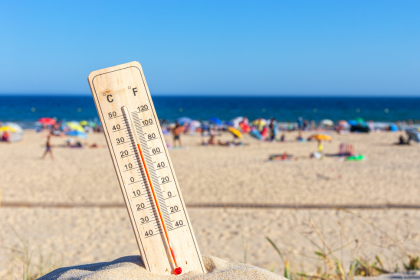GEA – Tips for Cooling Down in the Summer Heat
The continental U.S. could experience the hottest summer to date according to the 3-month outlook from the National Oceanic and Atmospheric Administration. This could be due to factors such as El Niño and climate change. And, with the heat wave affecting the eastern side of the U.S., this is just the beginning of a scorching summer. In this blog, we share heat-related issues, tips to beat the heat, and how supplemental insurance can play an important role during warmer weather.
Heat-Related Issues
Extreme temperatures come with a lot of issues for people and the environment. So, it's best to stay aware of all the possibilities.
Wildfires and Droughts
The sweltering summer and little rain that’s predicted in parts of the U.S. will put many regions at risk of droughts and wildfires. Throughout the summer, make sure to stay up to date on weather forecasts and local news for any warnings. It’s a smart idea to gather necessary supplies in case you need to quickly evacuate, including first aid kits. Other tips for wildfire season include knowing your evacuation routes and places to stay as well as making sure each household member knows how to use a fire extinguisher.
When experiencing a drought, it is important to use water wisely - for instance - watering your gardens in the early morning or evening when temperatures are cooler. Or, cleaning your driveway or patio with a broom instead of a hose. And, of course, try to use less water in general. Take shorter showers and only run the dishwasher when it’s full to help conserve water. Now is also the time to start collecting rainwater to use when water is scarce.
Heat Exhaustion and Heat Stroke
Extreme heat was responsible for the most weather-related deaths in 2022 and continues to be a top weather-related killer in the U.S.
Heat exhaustion, a common heat-related illness, is when the body's temperature rises and is unable to regulate its temperature and overheats. When left untreated, it can lead to heat stroke. Caused by prolonged exposure to feverish temperatures or physical exertion, heat exhaustion and stroke cause one to feel tired, have muscle cramps, a fever, nausea, dizziness, and more. To treat heat exhaustion, try these options:
- Lowering the individual’s body temperature by moving them to a cooler environment
- Drinking cool water
- Having them lie down
- Placing cool rags on their neck
You must immediately call 911 if they are experiencing the following as they may be experiencing heat stroke:
- Unable to drink
- Confusion
- High fever (over 104°F)
- Seizure
Knowing health-related considerations during high temperatures is important in the summertime, especially for at-risk individuals and the elderly. Luckily, during times like this, there are ways to help beat the heat.
Tips to Beat the Heat
With temperatures rising, it’s becoming harder to stay cool and safe while trying to enjoy the outdoors.
- Cool Down Inside
In the summer, everyone wants to spend their time outdoors. However, in extreme heat, it’s best to stay indoors. If you can't keep your home cool, try visiting a public library, art museum, mall, or other indoor public space to cool down. Additionally, during hot temperatures and heat advisories, move your outdoor workouts indoors and use a treadmill if accessible.
- Cool Off Your Skin
Cool down your skin with a damp rag, spray bottle, cool shower, or even running through a sprinkler. Or, if you can, cool off by swimming in a pool, lake, stream, or ocean.
- Stay Hydrated
In hot temperatures, we sweat more to cool ourselves down, so if we don’t drink enough water and replenish those lost fluids, we can become dehydrated. That’s why it’s very important to stay hydrated on hot days, especially if you’re outdoors or exercising. So, during the summer heat, make sure to drink plenty of water even if you’re not feeling thirsty.
- Keep Your Living Space Cool
Keep your home cool by closing your blinds and curtains during the day as well as opening your windows at night if it's cooler.
- Avoid the Hottest Part of the Day
Stay indoors or out of the sun if you can during the hottest hours of the day, which tend to be around 2 pm.
- Know the Signs of Heat-Related Illness
It’s helpful to know the signs and symptoms of heat-related illness in case you or someone you know is suffering.
Supplemental Insurance: A Safety Net for Heat-Related Illness
Supplemental insurance can play a key role during the sizzling summer months, especially when heat-related illnesses pose significant risks. As we discussed in this blog, it’s important to prioritize staying cool and hydrated as temperatures rise. However, unforeseen medical emergencies can still occur despite taking precautions. A supplemental insurance plan can help provide financial support and peace of mind during medical emergencies - whether it’s ambulance rides or emergency room visits due to heat-related illnesses.
Safeguard Your Summer with GEA
With GEA’s TRICARE and CHAMPVA supplemental plans, you can receive support when you need it most. Simply add our plan to your current primary TRICARE or CHAMPVA insurance and let us handle the rest. Visit our website to learn more.
Don’t wait until it’s too late. Let GEA’s supplemental plans help safeguard your health and wallet this summer.




